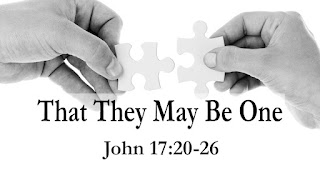John 17:20-26
Easter 7 / Year C
Jesus prayed, “As you, Father, are in me and I am in you,
may they [us who follow Jesus] also be in us, so that the world may believe
that you have sent me.”
It is sobering to ponder
the responsibility Jesus places on us.
Our actions – not just as individuals, but as a community – are to be a
witness to the world leading all to faith.
This includes how we treat each other in this place. It includes how we relate to other churches
in our area. It includes how we
participate in the common life of our diocese, our denomination, and the
Anglican Communion. It includes how
various expressions of the Christian faith – Evangelical, Pentecostal,
Anglo-Catholic, Socially Progressive, to name a few – express a sense of unity
amidst our obvious differences. When the
world looks at us and how we are in relationship with each other in Christ,
what does it see?
The late Marcus Borg, in his book The
Heart of Christianity, wrote about asking his unchurched university
students to turn in a short essay describing their impressions of
Christians. He states they consistently
used five adjectives: literalistic, anti-intellectual, self-righteous,
judgmental, and bigoted. Not exactly
what Jesus was hoping for, is it. Of
course, impressions are just that – impressions. They are both true and not true at the same
time. While it is easy to see how
someone might come to think of Christians in this way, it certainly is not
descriptive of every Christian or every Christian community. Still, it suggests we have a tough row to hoe
if we want our faith to be a positive witness to the world.
The oneness Jesus prays for isn’t just
about playing nice with each other. It is
a relationship rooted in God’s very nature.
I describe the Holy Trinity as being perfect Relational Harmony – the
Three in One and One in Three. Desiring
to share the essence of its relationship beyond itself, this Relational Harmony
brought forth creation and humankind to enjoy what lies at the heart of its very
Being. We live into this purpose (to use
a wonderful phrase from the prayer book) though “ever widening circles of
fellowship.” In a very real sense then,
our oneness is a manifestation of God’s very nature.
Oneness does not mean sameness. We don’t all like the same food. We don’t all root for the same team. We don’t all vote for the same candidate. We can be different, yet still be one.
Our country desperately needs this kind
of witness. On this Memorial Day
weekend, we pause to ponder the sacrifices made by so many to protect our great
American experiment. The soldiers who
fell on D-Day, for example, did not storm the beaches of Normandy as Republicans
and as Democrats. They acted as Americans
and as Allies. They were not the same,
but they were one.
Today we treat citizens with opinions
different from our own as dangerous enemies who want to destroy our country; at
least this is the message I hear trumpeted by polarizing talk shows at the
extreme edges of our political discourse.
America is looking less United and more tribal every day. We are squandering an important aspect of our
national heritage – e pulibus unum,
out of many one; a principle many gave their lives to defend and to protect.
The Christian Church has always struggled
to express its unity. In fact, if God
was a professor we’d be given a D- for our efforts, and this would be generous. But since God is God and God is merciful, our
grade is an Incomplete. We still have
time to finish the assignment.
When the church has been at its best it has
loved the people unloved by our society.
The Christian Way took root and endured persecution, in part, because
the least, the last, the lost, and the lonely found they were loved by those
who adhered to Jesus’ teachings. We
desperately need this kind of church in our country today.
On last Tuesday’s zoom call with diocesan
clergy, Bishop Susan talked about the need for us to mentor today’s youth. She noted the typical profile of a mass
shooter is a young, white male who is disenfranchised and lacks a father-figure
in his life. She noted it is easy to
scream for gun legislation, but more difficult to give of yourselves by being a
mentor, a coach, a neighbor to young isolated people.
USA TODAY interviewed Reid Meloy, a
board-certified forensic psychologist, who, after researching behaviors of
individuals prior to their committing acts of violence, has identified eight
warning signals of potential mass shooters.
While I don’t want to elaborate on them in this sermon, here is what is
striking about them: either the person who commits these heinous, unfathomable acts
is so isolated no one is paying attention to his troubling changes in behavior,
or those who are close to him simply don’t recognize the significance of the
changes they are seeing or, maybe, they are troubled but what they are seeing,
but don’t know where to turn.
Is it time for the church to filter out
into the community not as literalists, anti-intellectuals, self-righteous,
judgmental, and bigoted peddlers of some soft-soap, foul smelling religion, but
as people blessed to dwell at the heart of the Holy Trinity and willing to
share what we experience from this? Is it
time for us, here at St. Paul’s, to pray and dream and discuss how we might extend
our oneness to the people of our community – our schools, our playgrounds, our
neighborhoods? Do we believe our common
life in Christ is of value to our world?



No comments:
Post a Comment